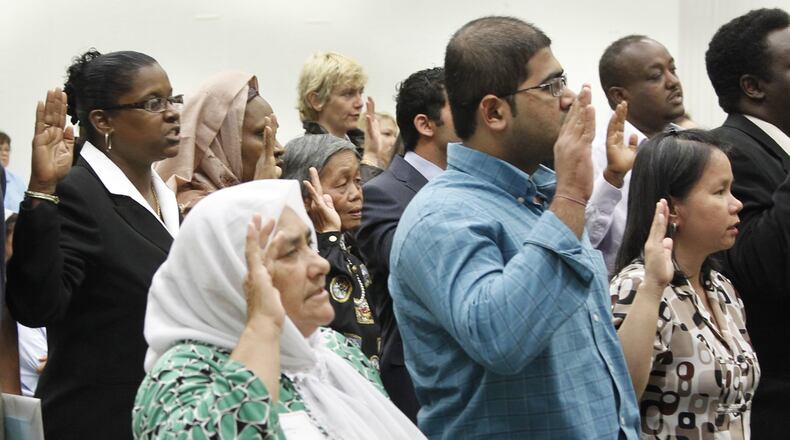Between just the first of the year and the coronavirus outbreak, 42 new refugees arrived to live in Montgomery County through Catholic Social Services. Nearly 300 resettled to the community last year.
“There are many people who are struggling now,” Roesch said.
Montgomery County’s immigrant population is 4.3 percent, or more than 23,000 residents, according to a 2018 Ohio Legal Assistance Foundation report. Many have likely been hit disproportionately by job losses.
Andrea Cregier, program coordinator at El Puente Educational Center in Dayton, said many parents of children her organization tutors worked at food service businesses before losing their jobs as restaurants closed and travel came to a halt.
“A lot of them have been very negatively impacted by a lot of the closures,” she said. “They’re all very worried about money and making ends meet.”
Immigrants make up about 13 percent of the U.S. population but account for 31 percent of hotel workers and 22 percent of food service workers, according to a Chicago Council on Global Affairs 2017 report.
MORE: What we know about Dayton’s immigrant population
In Dayton, most arriving refugees are from the Democratic Republic of Congo, Iraq and Eritrea, with the rest coming primarily from countries in East Africa and the Middle East, according to Catholic Social Services of the Miami Valley, which the agency handling voluntary resettlements through by the Bureau of Population Refugee and Migration and U.S. Department of Homeland Security.
El Puente Educational Center, with an office in east Dayton, currently works with 41 students in 30 families primarily from countries in Central America and South America. The center’s primary focus is tutoring kindergarten through sixth-grade students, Cregier said.
While most of the families are in the U.S. legally, some parents are in the middle of immigration court cases, which are now on hold due to the pandemic.
“There’s a lot of insecurity as to what they need to do and how they’re going to move forward,” Cregier said.
MORE: Lawyers, judges push to close immigration courts amid virus
Cregier said no more than 10% of the parents speak and understand English, which is a detriment to their children no longer able to attend schools.
“They’re struggling a lot currently with helping their kids with the homework packets that they were sent home with,” she said. “So there’s a lot of disparity, a lot of insecurities going on.”
Cregier and Imelda Ayala, the center’s parent advocate, along with a handful of University of Dayton students who work with El Puente, have adapted electronic means to communicate with families during the stay-at-home order.
Not all the families have computers, but do have smartphones, so tutoring can continue via WhatsApp, video chats and text messages, Cregier said.
MORE: Dayton’s immigrant population doubles: ‘You can get a better life’
Culturally, Cregier said families were slow to follow health advice coming out from the state and local agencies. But once schools here began to close everyone began to take it more seriously.
“There hadn’t been the case back in their home countries. They just kind of didn’t really believe it at first. There was a little bit of pushback,” she said. “But they got over that pretty quickly since everything just spread rapidly and everything changed.”
The center’s work since is centered on keeping the children calm and translating Centers for Disease Control and Prevention guidelines to keep families healthy.
Cregier said many families have had to forego not only medical appointments during the crisis, but also needed mental health therapy.
“Some of them have been in direct and war zones, they’ve left their homes. Some of them have been victims of human trafficking, sexual assaults and things of that sort,” she said. “So we do have a lot of families who have a lot of psychological needs.”
MORE: Area lawmakers want Ohio cities punished that don’t cooperate with immigration authorities
Roesch said Catholic Social Services is working primarily remotely to stay atop the needs of refugee families, providing in-person support when only critical.
“It’s not as personal, it’s not as satisfying for us,” Roesch said. “So much of what we typically do is in the home, because that’s how you can develop a full appreciation of what needs are and challenges and how we can best serve people.”
Jan Harry tried vainly last week to help a refugee she is mentoring sign up for unemployment.
“There are a lot of us trying to do this. And I understand that it’s an overburdened system,” Harry said. “It’s not a criticism of anybody. It’s just the reality we’re living in.”
While more than 187,000 Ohioans filed for unemployment the week ending March 21, the procedure is far more complicated for workers like the woman whose first language is Swahili, Harry said.
“Since she speaks very little English and doesn’t use a computer, I’m the one who is her eyes and ears to get jobs done for her to make sure that services are available.”
MORE: Record 3.28M jobless claims shatter previous records
The woman and her six children were living in a refugee camp before coming to the Dayton area and finding support from Harry and others at Harmony Creek Church. But the family faces yet another obstacle while adjusting to life here, Harry said.
“They’re going to be fine, fine citizens in this world … a fine job of being good, American people,” she said. “We’re concerned trying to keep them afloat.”
Refugee Clinic hours changed
Public Health - Dayton & Montgomery County’s Sexually Transmitted Disease Clinic (STD), Immunization, Tuberculosis (TB) and Refugee clinic’s hours have changed.
Hours of 8:00 am to noon, Monday to Friday will be in effect until further notice.
Public Health’s specialty clinics are limited to those services and cannot provide COVID-19 diagnosis, testing, or treatment. Call 937-225-4550 for appointments.
About the Author

